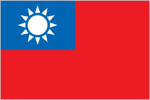Compare
Falkland Islands
to
Taiwanto
TaiwanThe GDP per capita in Taiwan is $39,600 while in Falkland Islands it is $55,400
This entry shows GDP on a purchasing power parity basis divided by population as of 1 July for the same year. A nation's GDP at purchasing power parity (PPP) exchange rates is the sum value of all goods and services produced in the country valued at prices prevailing in the United States. This is the measure most economists prefer when looking at per-capita welfare and when comparing living conditions or use of resources across countries. The measure is difficult to compute, as a US dollar value has to be assigned to all goods and services in the country regardless of whether these goods and services have a direct equivalent in the United States (for example, the value of an ox-cart or non-US military equipment); as a result, PPP estimates for some countries are based on a small and sometimes different set of goods and services. In addition, many countries do not formally participate in the World Bank's PPP project that calculates these measures, so the resulting GDP estimates for these countries may lack precision. For many developing countries, PPP-based GDP measures are multiples of the official exchange rate (OER) measure. The differences between the OER- and PPP-denominated GDP values for most of the wealthy industrialized countries are generally much smaller.
Source:
CIA World Factbook
Falkland Islands consumes 4.4352 gallons of oil per day per capita while Taiwan consumes 1.4154
This entry is the total oil consumed in gallons per day (gal/day) divided by the population. The discrepancy between the amount of oil produced and/or imported and the amount consumed and/or exported is due to the omission of stock changes, refinery gains, and other complicating factors.
Source:
CIA World Factbook
The per capita consumption of electricity in Falkland Islands is 6,221kWh while in Taiwan it is 10,368kWh
This entry consists of total electricity generated annually plus imports and minus exports, expressed in kilowatt-hours. The discrepancy between the amount of electricity generated and/or imported and the amount consumed and/or exported is accounted for as loss in transmission and distribution.
Source:
CIA World Factbook
Taiwan has an unemployment rate of 4.00% while Falkland Islands has 4.10%
This entry contains the percent of the labor force that is without jobs.
Source:
CIA World Factbook
 With its 23,359,928 people, Taiwan is the
51st largest country in the world by
population. It is the 137th largest country in the
world by area with 35,980 square kilometers.
With its 23,359,928 people, Taiwan is the
51st largest country in the world by
population. It is the 137th largest country in the
world by area with 35,980 square kilometers.
In 1895, military defeat forced China's Qing Dynasty to cede Taiwan to Japan. Taiwan came under Chinese Nationalist control after World War II. Following the communist victory on the mainland in 1949, 2 million Nationalists fled to Taiwan and established a government using the 1947 constitution drawn up for all of China. Beginning in the 1950s, the ruling authorities gradually democratized and incorporated the local population within the governing structure. This process expanded rapidly in the 1980s. In 2000, Taiwan underwent its first peaceful transfer of power from the Nationalist (Kuomintang or KMT) to the Democratic Progressive Party. Throughout this period, the island prospered and became one of East Asia's economic "Tigers." The dominant political issues continue to be management of sensitive relations between Taiwan and China - specifically the question of Taiwan's eventual status - as well as domestic priorities for economic reform and growth.
Check out the recommended reading list below for great sources of information on Taiwan